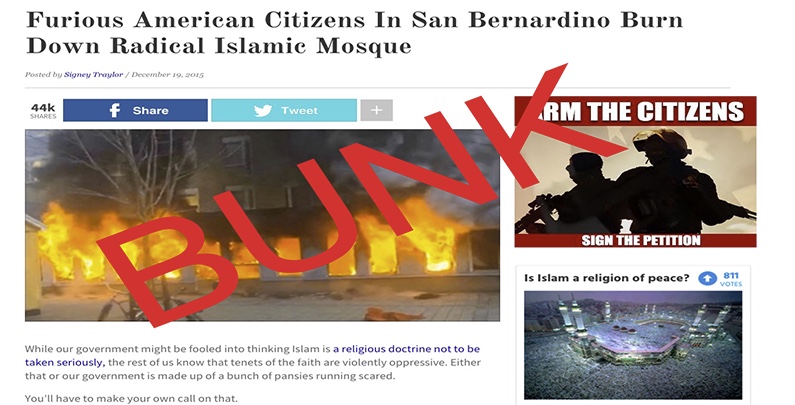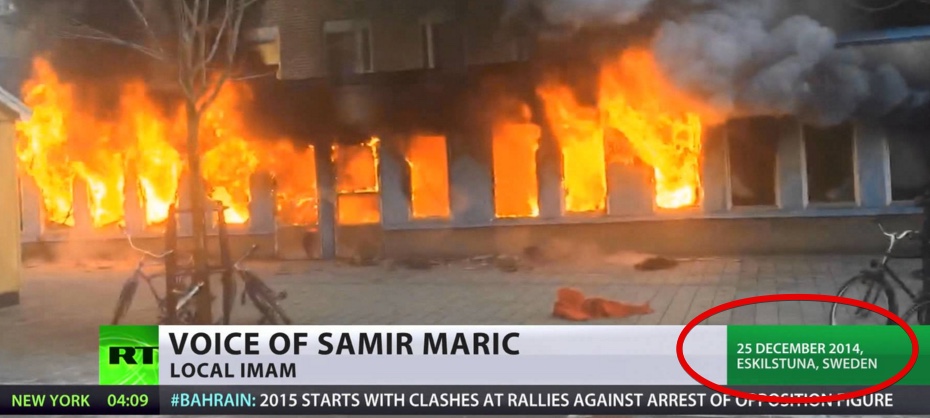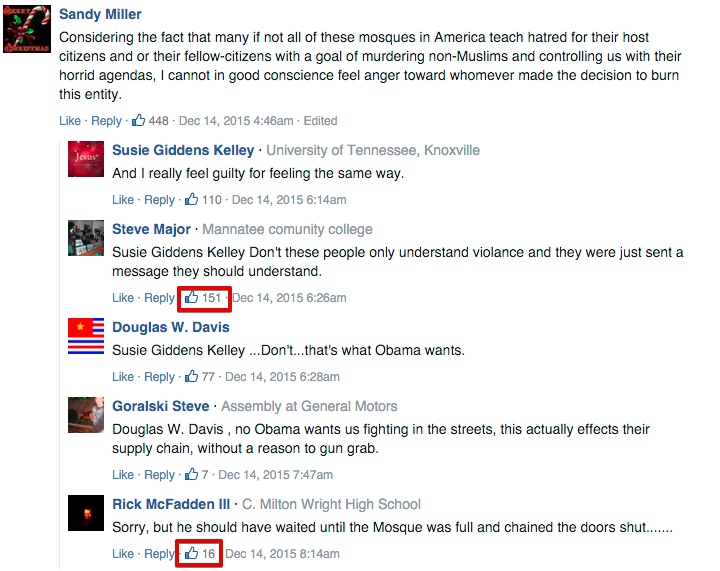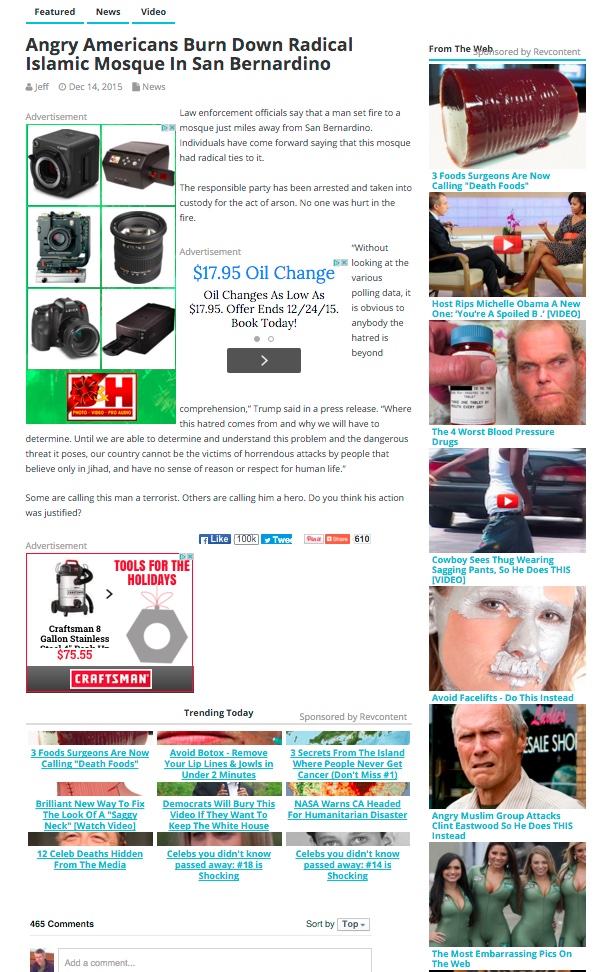
On December 11, 2015, 23 year old Carl James Dial Jr., of Palm Desert was arrested for the firebombing of mosque of the Islamic Society of the Coachella Valley earlier that day. The lobby of the building was damaged, and nobody was injured. Dial seems to have acted alone, and the mosque was 75 miles away from San Bernardino. Yet the story was reported as "Furious American Citizens In San Bernardino Burn Down Radical Islamic Mosque".
This is bunk because of the facts stated above. It was just one young man (as far as is known), it was not in San Bernardino, the mosque was not burnt down. The photo used in the story is that of a Mosque in Sweden, burned in 2014.

The Coachella mosque does not seem to be "radical" either - after the attack the Iman, Reymundo Nour, held a community meeting:
http://www.desertsun.com/story/news...am-speaks-out-true-islam-after-fire/77505946/
Interestingly, the father of the alleged attacker described him as struggling socially:The mosque, which plans to rebuild on land members had already arranged to buy, wants to put closure to the hate crime, acting Imam Reymundo Nour said. This is why he wanted to reach out to the community and offer information about what he and his fellow Muslims believe.
If someone truly knows them, it will be harder for hateful rhetoric to take over, Nour said, and easier to separate them from the radicalized factions of the religion which he believes cannot be classified as real Muslims.
“For anyone who believes that Islam is to cause destruction or harm or to wreak havoc and destruction is not a true Muslim,” Nour said. “I know today that it may be hard to believe that Islam is related to anything close to peace, but we have to separate Islam from culture. ... If someone behaves this way, they are completely misguided and have misread the scriptures.”
http://abcnews.go.com/US/wireStory/authorities-detain-person-interest-mosque-arson-fire-35734024
This illustrates a very real problem. People are increasingly getting their information from a very narrow set of sources that tend to reinforce each other. Things that are false spread within those social media groups because the members of the groups want to believe. They want to believe stories about radical mosques, because they strongly believe in such stories. They then participate online in discussion of the stories with a very specific world-view.
John Dial told NBC News he saw his son carrying a backpack on Friday and he assumed he was going to class at a local college. He said his son struggled socially.
"He was caught up in social media. Social media has produced people like my son, without person-to-person contact," the father said. "I believe he was lacking in social skills."

The comments above come from the same site that the "Furious American Citizens ..." headline came from. It's a site called "US Herald", which got the story from "American News". Both sites exemplify a recent trend of promoting fear based stories for advertising revenue. It's a type of fear and anger clickbait marketing that was described by Caitlin Dewey of the Washington Post, when she explained why she's changing her approach to fighting fake news:
https://www.washingtonpost.com/news...ernet-this-week-why-this-is-the-final-column/
Look at the "American News" version of the story to see this in action.There’s a simple, economic explanation for this shift: If you’re a hoaxer, it’s more profitable. Since early 2014, a series of Internet entrepreneurs have realized that not much drives traffic as effectively as stories that vindicate and/or inflame the biases of their readers. Where many once wrote celebrity death hoaxes or “satires,” they now run entire, successful websites that do nothing but troll convenient minorities or exploit gross stereotypes. Paul Horner, the proprietor of Nbc.com.co and a string of other very profitable fake-news sites, once told me he specifically tries to invent stories that will provoke strong reactions in middle-aged conservatives. They share a lot on Facebook, he explained; they’re the ideal audience.
As manipulative as that may seem, many other sites are worse: there’s Now8News, which runs outrageous crime stories next to the stolen mugshots of poor, often black, people; or World News Daily Report, which delights in inventing items about foreigners, often Muslims, having sex with or killing animals.
Needless to say, there are also more complicated, non-economic reasons for the change on the Internet hoax beat. For evidence, just look at some of the viral stories we’ve debunked in recent weeks: American Muslims rallying for ISIS, for instance, or Syrians invading New Orleans. Those items didn’t even come from outright fake-news sites: They originated with partisan bloggers who know how easy it is to profit off fear-mongering.

The "story" itself is a tiny inflammatory and highly inaccurate retelling of what happened, spiced up with a Donald Trump quote, and ending with a leading question designed to get people commenting:
And it's totally surrounded by advertising.Some are calling this man a terrorist. Others are calling him a hero. Do you think his action was justified?
This is exactly the type of thing Dewey described, a pile of clickbait designed to exploit the fear and anger of a specific subset of American culture. According to Carl Dial's father, this seems to have been the very thing that led to the attack in the first place. A vicious cycle of hate that seems to be self sustaining, the flames being strongly fanned by internet advertising.
Can the situation be improved? Dewey has given up the whack-a-mole approach to debunking, where she would try to collate lists of "what was fake on the internet this week". There's an endless stream of such bunk, and Dewey notes that the true believers will simply ignore debunking from sources like the Washington Post.
But as I've said several times, my debunking is not aimed at true believers, but on helping people who are more on the fence, or who are attempting to get out of the rabbit hole. Debunking of individual claims is very helpful to these people, and it's also helpful to people who are friends or relatives of true believers.
But I think that more can be done. I think that the echo chambers and walled gardens of social media need to hear the voice of reason, and that can't be done just by posting on Metabunk. We need to actually go in there and politely talk to people. There needs to be a grassroots approach to debunking.
Last edited:

